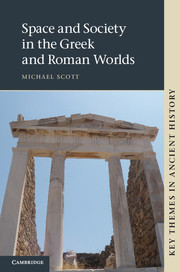Book contents
- Frontmatter
- Contents
- Illustrations
- Acknowledgements
- Abbreviations
- Introduction
- Chapter 1 Inheriting and articulating a community
- Chapter 2 Networks of polytheism: spaces for the gods at Delos
- Chapter 3 Spaces of alienation: street-lining Roman cemeteries
- Chapter 4 A spatial approach to relationships between colony and metropolis
- Chapter 5 The place of Greece in the oikoumene of Strabo’s Geography
- Conclusion: space and society in the Greek and Roman worlds
- Bibliographic essay
- Bibliography
- Index
Chapter 5 - The place of Greece in the oikoumene of Strabo’s Geography
Published online by Cambridge University Press: 05 December 2012
- Frontmatter
- Contents
- Illustrations
- Acknowledgements
- Abbreviations
- Introduction
- Chapter 1 Inheriting and articulating a community
- Chapter 2 Networks of polytheism: spaces for the gods at Delos
- Chapter 3 Spaces of alienation: street-lining Roman cemeteries
- Chapter 4 A spatial approach to relationships between colony and metropolis
- Chapter 5 The place of Greece in the oikoumene of Strabo’s Geography
- Conclusion: space and society in the Greek and Roman worlds
- Bibliographic essay
- Bibliography
- Index
Summary
Introduction
Lefebvre argued in his influential book The Production of Space (1991 (1974): 15) that ‘any search for space in literary texts will find it everywhere and in every guise: enclosed, described, projected, dreamt of, speculated about’. Since the original publication of Lefebvre’s work, there has been, as noted in the introduction, a vast growth in interest in space and spatiality across a wide variety of literary genres in both Greek and Roman scholarship. This final case-study seeks to utilise these recent advances in the understanding of space and text in the analysis of a work particularly concerned with space: Strabo’s Geography.
The first section aims to set up the context for, and demonstrate the importance of, that analysis, first by examining recent approaches to the genre of geographical and universal history-writing and second by looking at how past scholarship has investigated and characterised Strabo and his Geography. In particular, it will focus on showing how past scholarship has been insufficiently interested in Strabo’s treatment of the world at a regional level (i.e. that of ‘Italy’, or ‘Greece’). This chapter will then take as its focus Strabo’s portrayal of Greece within the Geography, investigating the meaning and value of Greece as a space within the oikoumene of Strabo (cf. Figure 5.1), and the ways in which that spatial meaning has been constructed. The analysis will be divided into three sections: first, an examination of how Strabo conceptualises geographical knowledge and frames his project; second, an investigation of how Greece is constructed as a space within Strabo’s narratives of other parts of the oikoumene; and third, Strabo’s narrative construction of the space of Greece itself. In so doing, I hope to show how a spatial approach can contribute also to our understanding of the wider context of Strabo’s writing, his audience, the transitional world of Augustan and Tiberian Rome, and Strabo’s place within it.
- Type
- Chapter
- Information
- Space and Society in the Greek and Roman Worlds , pp. 137 - 158Publisher: Cambridge University PressPrint publication year: 2012



